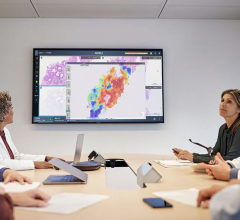
February 6, 2019 — Oxford University Hospitals (OUH) is trialing clinical collaboration technology from Barco for its Multi-disciplinary Cancer Conferences. The primary focus of this cooperation is to streamline the preparation, management and follow-up of these meetings. With the Barco Synergi solution, preparation for the conference is more efficient, the meeting experience is seamless for both local and remote participants, and critical follow-up actions are handled promptly.
Multi-disciplinary Cancer Conferences (also called tumor boards or multi-disciplinary team meetings) are designed to ensure the best patient outcomes by bringing the clinical care team together to discuss all applicable diagnostic tests, suitable treatment options and treatment recommendations for each cancer patient.
Multi-disciplinary team meetings (MDTs) in cancer are the most expensive meetings per hour in the U.K. National Health System (NHS) due to the wide range of experts involved, and the need to bring together a wide variety of information; this includes patient records, imaging, pathology slides, cancer staging and genetic testing.
Nick Maynard, the OUH lead for cancer, said: “We have worked with Barco to develop a tool that can collect and organize the information and data so it is easily presented and understood. It will also enable the rapid transfer, by automated electronic notification, of the outcome of the MDT discussion and decisions made to all staff involved in the patient’s care.”
The Barco Synergi technology addresses the challenge of pulling together all the relevant patient case information for discussion during cancer conferences. Barco’s cloud-based software solution gathers all relevant patient data, documents the stage of the patient's tumor, and makes it easy to share this information with the entire care team.
It provides an intuitive, fast and secure way to share any images and other patient information from any workstation with the team, eliminating the need to transfer images from one site to the other for the sake of the meeting. “In-meeting approval” of treatment recommendation by the meeting chair and automated upload of the treatment outcome to the Cerner Millennium electronic health record (EHR), results in quick scheduling of the treatment for the patients, thus reducing patient wait times.
Continuous visibility of all this critical patient information, as well as the recommended outcome of every patient being discussed, enables flexible planning of every cancer team member around the patient resulting in huge efficiency gains.
Maynard added, “We believe this will lead to not only a significant improvement in the efficiency of the MDT meetings, but also a significant reduction in the time between referral of the patient and commencement of treatment. This tool also records and analyzes MDT performance and outcomes in real-time, enabling us to identify service improvements rapidly.”
The trialing of the new system has been supported by the National Institute for Health Research (NIHR) Oxford Biomedical Research Centre, which aims to translate medical innovation into clinical benefits for patients.
For more information: www.barco.com


 July 26, 2024
July 26, 2024 








